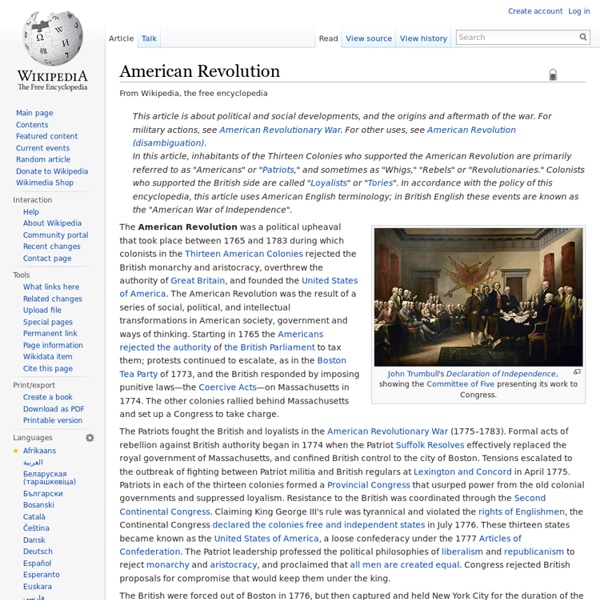Egalitarianism
Trend of thought that favors equality for all people Egalitarianism (from French égal, meaning 'equal'), or equalitarianism,[1][2] is a school of thought within political philosophy that prioritizes equality for all people.[3] Egalitarian doctrines are generally characterized by the idea that all humans are equal in fundamental worth or moral status.[4] According to the Merriam-Webster Dictionary, the term has two distinct definitions in modern English,[5] namely either as a political doctrine that all people should be treated as equals and have the same political, economic, social and civil rights,[6] or as a social philosophy advocating the removal of economic inequalities among people, economic egalitarianism, or the decentralization of power. Some sources define egalitarianism as the point of view that equality reflects the natural state of humanity.[7][8][9] Forms[edit] Legal egalitarianism[edit]
Thirteen Colonies
British American colonies which became the United States The Thirteen Colonies, also known as the Thirteen British Colonies[2] or the Thirteen American Colonies,[3] were a group of colonies of Great Britain on the Atlantic coast of America founded in the 17th and 18th centuries which declared independence in 1776 and formed the United States of America. The Thirteen Colonies had very similar political, constitutional, and legal systems and were dominated by Protestant English-speakers. They were part of Britain's possessions in the New World, which also included colonies in Canada, Florida, and the Caribbean. The colonial population grew from about 2,000 to 2.4 million between 1625 and 1775, displacing American Indians. The Thirteen Colonies had a high degree of self-governance and active local elections, and they resisted London's demands for more control.
American Revolutionary War
War between Great Britain and the Thirteen Colonies, which won independence as the United States of America The American Revolutionary War (1775–1783), also known as the American War of Independence,[43] was a war between Great Britain and its Thirteen Colonies in North America which declared independence in July 1776 as the United States of America.[N 1]
Kingdom of Great Britain
Constitutional monarchy in Western Europe between 1707 and 1801 The Kingdom of Great Britain, officially called Great Britain,[1][2] was a sovereign state in western Europe from 1 May 1707 to 1 January 1801. The state came into being following the Treaty of Union in 1706, ratified by the Acts of Union 1707, which united the kingdoms of England (which included Wales) and Scotland to form a single kingdom encompassing the whole island of Great Britain and its outlying islands, with the exception of the Isle of Man and the Channel Islands. The unitary state was governed by a single parliament and government that was based in Westminster. The former kingdoms had been in personal union since James VI of Scotland became King of England and King of Ireland in 1603 following the death of Elizabeth I, bringing about the "Union of the Crowns". The early years of the newly united kingdom were marked by Jacobite risings which ended in defeat for the Stuart cause at Culloden in 1746.
Thomas Paine
Paine lived in France for most of the 1790s, becoming deeply involved in the French Revolution. He wrote the Rights of Man (1791), in part a defence of the French Revolution against its critics. His attacks on British writer Edmund Burke led to a trial and conviction in absentia in 1792 for the crime of seditious libel.
Pamphlet
An 18th-century painting of a girl with a basket of pamphlets Due to their low cost and ease of production, pamphlets have often been used to popularize political or religious ideas. A pamphlet is an unbound book (that is, without a hard cover or binding).
Antoine Gilbert Griffet de Labaume
Antoine Gilbert Griffet de Labaume (21 November 1756, Moulins – 18 March 1805) was an 18th-century French writer, playwright and translator. He died in Paris aged 48. Biography[edit] A writer gifted of the most extensive knowledge and with a talent of great ease,[according to whom?] Labaume had a good education and learned, in addition, the English, German and Italian languages. He obtained a modest[clarification needed] employment at the Interior Ministry, and made several translations, whose flow increased a little fortune which was quite modest.
Battles of Lexington and Concord
The Battles of Lexington and Concord were the first military engagements of the American Revolutionary War.[9] The battles were fought on April 19, 1775 in Middlesex County, Province of Massachusetts Bay, within the towns of Lexington, Concord, Lincoln, Menotomy (present-day Arlington), and Cambridge. They marked the outbreak of armed conflict between the Kingdom of Great Britain and its thirteen colonies in America. In late 1774, Colonial leaders adopted the Suffolk Resolves in resistance to the alterations made to the Massachusetts colonial government by the British parliament following the Boston Tea Party. The colonial assembly responded by forming a Patriot provisional government known as the Massachusetts Provincial Congress and calling for local militias to train for possible hostilities.



